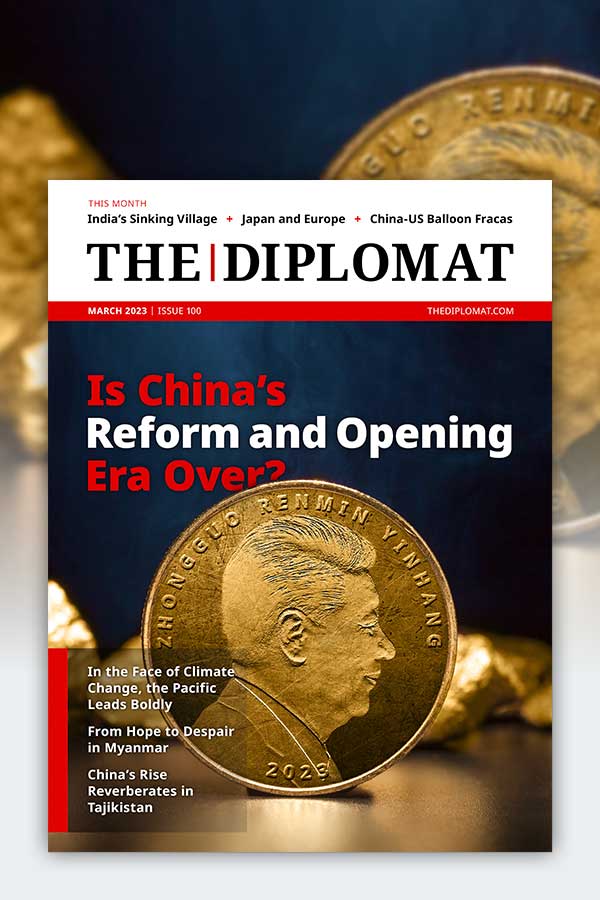| Welcome to the latest issue of Diplomat Brief. This week our top story examines how Thailand’s student protesters are approaching the upcoming general election. We also have an interview with Angshuman Choudhury, an associate fellow at the New Delhi-based Centre for Policy Research, about India’s approach to post-coup Myanmar. |
| Story of the week |  | Politics Ex-Student Protesters Prepare for Thailand’s ElectionWhat Happened: In 2020 and 2021, mass protests, led by Thai students, swept across Thailand. The protesters, outraged by the forced dissolution of the popular Future Forward Party, wanted an end to coup leader-turned-Prime Minister Prayut Chan-o-cha’s government, with new elections held. They even took aim at the role of the monarchy in Thailand’s politics, long a taboo topic. Now as the country prepares for its first elections since the protest movement, Thailand could see the former protesters make waves at the ballot box – or face further repression by Thailand’s conservative elites. Our Focus: The 2020-21 protests were “our generation’s awakening. It helped us realize we can strive to demand better for our democracy and our society,” Sirabhob Attohi, a student at Chulalongkorn University and protest organizer, told The Diplomat. “We felt hope that political change was possible.” The activist added that some political parties – notably Pheu Thai, which has won every Thai election since 2001 – have been active about “reaching out to young voters who have become disillusioned with Thai politics.” But others believe the disillusionment runs deeper than the ballot box can solve, especially after experiences of violent repression at the hands of police, “The rule of law needs to be restored before youths can trust the government again, and this can only be addressed through structural change,” another student protester told The Diplomat. What Comes Next: Thailand’s 2019 election, the first under a new constitution that carved out an influential role for Thailand’s military, was seen as skewed in Prayut’s favor. That was a key impetus for the 2020 protests to begin with – especially after the main threat to Prayut’s power, the upstart Future Forward Party, was dismantled by judicial fiat. Another rigged election that installs Prayut – or a rival general – in power will likely stir more discontent among young Thais. On the other hand, every democratically elected government in Thailand has been forced out of power, most recently via the 2014 military coup. Whatever the result of May’s election, given the yawning gap between young Thais’ aspirations and the elites’ preferences, Thailand will likely face more instability ahead. Read this story |
| Behind the News | INTERVIEW Angshuman ChoudhuryAngshuman Choudhury, associate fellow at the New Delhi-based Centre for Policy Research, on India’s support for Myanmar’s military junta: “Through 2021, India emphasized issues like the restoration of democracy and the release of political prisoners in its bilateral statements. But over the last year, New Delhi has quietly dropped all references to democracy in bilateral meetings.” Read the interview |
| This Week in Asia | Northeast Asia Xi in Russia, Kishida in UkraineChina’s President Xi Jinping made his first visit to Russia in almost four years this week, highlighting China’s ambition to push for peace talks between Russia and Ukraine. Japan’s Prime Minister Kishida Fumio purposefully scheduled a surprise trip to Kyiv for the same time, making good on a long-standing invitation from Ukrainian President Zelenskyy. The question now is what actions will follow the rhetoric. Will Japan step up aid to Ukraine to match its G-7 partners? And will China follow up on its emphasis on peace talks with actual mediation attempts, starting with Xi’s first phone call with Zelenskyy? Find out more | South Asia India’s Quad Diplomacy ContinuesLess than two weeks after hosting Australian Prime Minister Anthony Albanese, India saw a visit from another Quad leader: Japan’s Kishida Fumio. The visits continued the trend of India’s advancing ties with the grouping of Asia-Pacific democracies, while also making clear New Delhi’s central role in the various “Free and Open Indo-Pacific” strategies being deployed. Find out more | Southeast Asia Thai PM Dissolves ParliamentThailand’s Prime Minister Prayut Chan-o-cha this week officially dissolved parliament, paving the way for a general election that will be held sometime in May. According to the constitution, the election must fall within 45-60 days, making May 7 or May 14 the most likely election dates. The polls will once again see a showdown between the Pheu Thai Party, which is associated with the exiled former Prime Minister Thaksin Shinawatra (and led by his daughter Paetongtarn), and the country’s conservative establishment. The PTP and its successors have won every Thai election since 2001, but face a serious obstacle in the form of the Senate, whose 250 military-appointed members will help select the prime minister. Find out more | Central Asia Is “New Kazakhstan” Now Complete?With last weekend’s parliamentary election, Kazakh President Kassym-Jomart Tokayev’s “New Kazakhstan” has fully arrived: There’s a revised constitution, a renewed presidency, and a reconfigured parliament. But with dramatically low turnout and a victory for the ruling party, it seems that “New Kazakhstan” is just a rebranding of old Kazakhstan. Find out more |
| Visualizing APAC |  | In Bangladesh’s Chattogram coastal region, local fishers and farmers are already feeling the effects of climate change. Now they worry about displacement and pollution caused by new fossil fuel power plans. See the full picture |
| Word of the Week | Society 이생망Isaengmang, an acronym for the phrase “my life is ruined” in Korean. The neologism has gained popularity amid a growing sense of frustration, disillusionment, and hopelessness among Koreans. Find out more |
|  |




